George Will in The Washington Post:
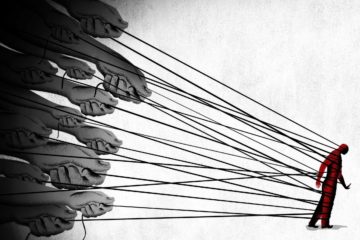 During the 2012 presidential election, there occurred one of those remarkably rare moments when campaign rhetoric actually clarified a large issue. It happened when Barack Obama, speaking without a written text, spoke from his heart and revealed his mind: “Look, if you’ve been successful, you didn’t get there on your own. . . . If you were successful, somebody along the line gave you some help. There was a great teacher somewhere in your life. Somebody helped to create this unbelievable American system that we have that allowed you to thrive. Somebody invested in roads and bridges. If you’ve got a business — you didn’t build that. Somebody else made that happen. The Internet didn’t get invented on its own. Government research created the Internet so that all the companies could make money off the Internet. The point is, is that when we succeed, we succeed because of our individual initiative, but also because we do things together.”
During the 2012 presidential election, there occurred one of those remarkably rare moments when campaign rhetoric actually clarified a large issue. It happened when Barack Obama, speaking without a written text, spoke from his heart and revealed his mind: “Look, if you’ve been successful, you didn’t get there on your own. . . . If you were successful, somebody along the line gave you some help. There was a great teacher somewhere in your life. Somebody helped to create this unbelievable American system that we have that allowed you to thrive. Somebody invested in roads and bridges. If you’ve got a business — you didn’t build that. Somebody else made that happen. The Internet didn’t get invented on its own. Government research created the Internet so that all the companies could make money off the Internet. The point is, is that when we succeed, we succeed because of our individual initiative, but also because we do things together.”
The italicized words ignited a heated debate, and Obama aides insisted that their meaning was distorted by taking them “out of context.” But Obama was merely reprising something said less than a year earlier by Elizabeth Warren, a former member of his administration who was campaigning to become a U.S. senator from Massachusetts. She said: “There is nobody in this country who got rich on his own. Nobody. You built a factory out there — good for you. But I want to be clear. You moved your goods to market on the roads the rest of us paid for. You hired workers the rest of us paid to educate. You were safe in your factory because of police forces and fire forces that the rest of us paid for. . . . You built a factory and it turned into something terrific or a great idea — God bless, keep a big hunk of it. But part of the underlying social contract is you take a hunk of that and pay forward for the next kid who comes along.”
More here.

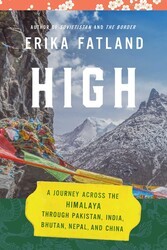 A
A 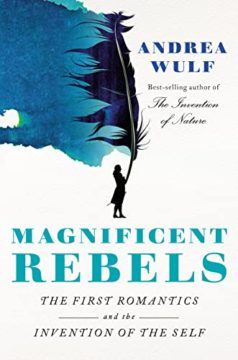 In 1793 Caroline Böhmer paid for her support for the French Revolution with arrest by the Prussians and three months of incarceration in a damp, dark, overcrowded, vermin-infested cell in the fortress of Königstein. It was made doubly painful by her having to share her suffering with her seven-year-old daughter. Intelligent, well educated, physically attractive, articulate and with a strong personality (‘I never flatter, I say what I think and feel’), Böhmer liked to be in charge. She was also unconventional when it came to sexual morality. Her spell in prison was complicated by the discovery that she was pregnant, the result of a one-night stand with a teenage French soldier. It was not to be the last of her extramarital adventures.
In 1793 Caroline Böhmer paid for her support for the French Revolution with arrest by the Prussians and three months of incarceration in a damp, dark, overcrowded, vermin-infested cell in the fortress of Königstein. It was made doubly painful by her having to share her suffering with her seven-year-old daughter. Intelligent, well educated, physically attractive, articulate and with a strong personality (‘I never flatter, I say what I think and feel’), Böhmer liked to be in charge. She was also unconventional when it came to sexual morality. Her spell in prison was complicated by the discovery that she was pregnant, the result of a one-night stand with a teenage French soldier. It was not to be the last of her extramarital adventures. A joke has structure. It has a central rule. Setup, punchline. The setup produces a tensed, expectant state; the punchline resolves the tension with a surprise. If the elements of the joke are not arranged into a setup and a punchline, it is not a joke. It is just a statement.
A joke has structure. It has a central rule. Setup, punchline. The setup produces a tensed, expectant state; the punchline resolves the tension with a surprise. If the elements of the joke are not arranged into a setup and a punchline, it is not a joke. It is just a statement. Much remains to be learned about the nature and origins of various sex differences, but more is known than most people realize. Much of the current confusion is generated by activists who suppress, attack, and distort information on sex differences in order to reinforce their preferred ideological narratives. These ideology-driven distortions are helpfully illustrated by a recent New York Times
Much remains to be learned about the nature and origins of various sex differences, but more is known than most people realize. Much of the current confusion is generated by activists who suppress, attack, and distort information on sex differences in order to reinforce their preferred ideological narratives. These ideology-driven distortions are helpfully illustrated by a recent New York Times  Mikhail Gorbachev was a contradictory figure; his legacy, complex. Hailed in the West as a
Mikhail Gorbachev was a contradictory figure; his legacy, complex. Hailed in the West as a  Through a series of vignettes peppered with illustrative analogies and vibrant characters, Siddhartha Mukherjee invites readers of his new book, The Song of the Cell, on a tour of cell biology from its early origins to its present and future applications. Mukherjee is clear from the start that the book is not a comprehensive history of the field but rather a meandering journey through selected seminal scientific discoveries. The book’s conversational style draws the reader in, and the text is enlivened by descriptions of major players in the field. We learn, for example, that Frederick Banting—co-winner of the Nobel Prize for the discovery of insulin—devised his key experiment only after experiencing financial difficulties in his medical practice, a broken-down car, and a sleepless night puzzling over a recently published journal article.
Through a series of vignettes peppered with illustrative analogies and vibrant characters, Siddhartha Mukherjee invites readers of his new book, The Song of the Cell, on a tour of cell biology from its early origins to its present and future applications. Mukherjee is clear from the start that the book is not a comprehensive history of the field but rather a meandering journey through selected seminal scientific discoveries. The book’s conversational style draws the reader in, and the text is enlivened by descriptions of major players in the field. We learn, for example, that Frederick Banting—co-winner of the Nobel Prize for the discovery of insulin—devised his key experiment only after experiencing financial difficulties in his medical practice, a broken-down car, and a sleepless night puzzling over a recently published journal article. I
I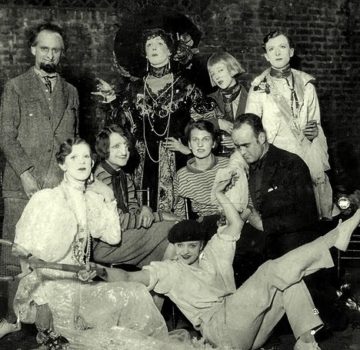 Inez Holden’s diary – a mammoth undertaking, only fragments of which have ever escaped into print – carries a rueful little entry from August 1948. “I read Brideshead Revisited by Evelyn Waugh,” the diarist writes. But the tale of Charles Ryder’s dealings with the tantalising progeny of the Marquess of Marchmain, here in an unfallen world of Oxford quadrangles and stately pleasure domes, awakens a feeling of “nostalgic depression”. This, Holden decides, is simply another of “those stories of High Life of the Twenties which everyone seemed to have enjoyed but I never did”.
Inez Holden’s diary – a mammoth undertaking, only fragments of which have ever escaped into print – carries a rueful little entry from August 1948. “I read Brideshead Revisited by Evelyn Waugh,” the diarist writes. But the tale of Charles Ryder’s dealings with the tantalising progeny of the Marquess of Marchmain, here in an unfallen world of Oxford quadrangles and stately pleasure domes, awakens a feeling of “nostalgic depression”. This, Holden decides, is simply another of “those stories of High Life of the Twenties which everyone seemed to have enjoyed but I never did”. There are many complex theories about the nature and function of art; I am going to propose a very simple one. My simple theory is also broad: it applies to narrative fiction broadly conceived, from epic poems to Greek tragedies to Shakespearean comedies to short stories to movies. It also applies to most pop songs, many lyric poems and some—though far from most—paintings, photographs and sculptures. My theory is that art is for seeing evil.
There are many complex theories about the nature and function of art; I am going to propose a very simple one. My simple theory is also broad: it applies to narrative fiction broadly conceived, from epic poems to Greek tragedies to Shakespearean comedies to short stories to movies. It also applies to most pop songs, many lyric poems and some—though far from most—paintings, photographs and sculptures. My theory is that art is for seeing evil. T
T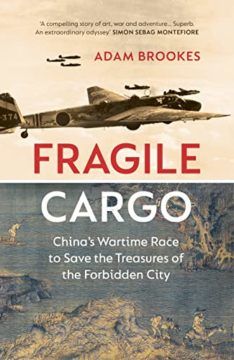 A
A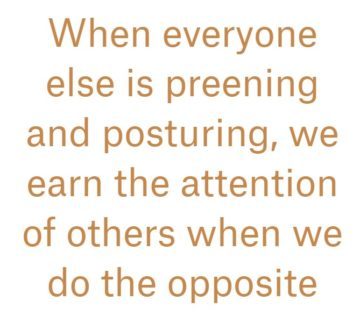 Speaking broadly, Leibniz’s rules fall into three basic categories: advice on how to communicate with others, advice on how to carry oneself with others, and advice on the sorts of subjects one ought to study. On the first front, Leibniz argues that effective communication requires us to engage our audience’s attention in such a way that others will feel connected to and included in our conversation. In this vein, we’re told that ‘small commonplaces’ that ‘can be told or recounted with flair’ get noticed. Later, we’re told we ought to ‘intermix some charm into business negotiations and meetings’, and that, in more casual conversations, we should make sure to give openings so that ‘every person recounts something’ and has an opportunity to speak their mind. The lesson here is that when we speak with others, we should ‘work to bring new things up’ in such a way that others are ‘drawn into conversation’.
Speaking broadly, Leibniz’s rules fall into three basic categories: advice on how to communicate with others, advice on how to carry oneself with others, and advice on the sorts of subjects one ought to study. On the first front, Leibniz argues that effective communication requires us to engage our audience’s attention in such a way that others will feel connected to and included in our conversation. In this vein, we’re told that ‘small commonplaces’ that ‘can be told or recounted with flair’ get noticed. Later, we’re told we ought to ‘intermix some charm into business negotiations and meetings’, and that, in more casual conversations, we should make sure to give openings so that ‘every person recounts something’ and has an opportunity to speak their mind. The lesson here is that when we speak with others, we should ‘work to bring new things up’ in such a way that others are ‘drawn into conversation’.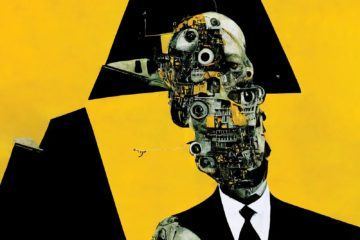 In policy circles, discussions about artificial intelligence invariably pit China against the United States in a race for technological supremacy. If the key resource is data, then China, with its billion-plus citizens and lax protections against state surveillance, seems destined to win. Kai-Fu Lee, a famous computer scientist, has claimed that data is the new oil, and China the new OPEC. If superior technology is what provides the edge, however, then the United States, with its world class university system and talented workforce, still has a chance to come out ahead. For either country, pundits assume that superiority in AI will lead naturally to broader economic and military superiority.
In policy circles, discussions about artificial intelligence invariably pit China against the United States in a race for technological supremacy. If the key resource is data, then China, with its billion-plus citizens and lax protections against state surveillance, seems destined to win. Kai-Fu Lee, a famous computer scientist, has claimed that data is the new oil, and China the new OPEC. If superior technology is what provides the edge, however, then the United States, with its world class university system and talented workforce, still has a chance to come out ahead. For either country, pundits assume that superiority in AI will lead naturally to broader economic and military superiority.